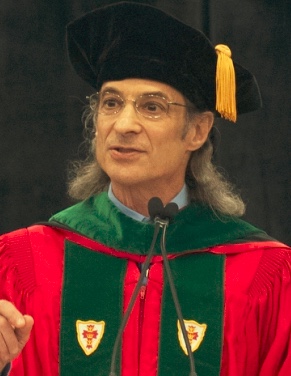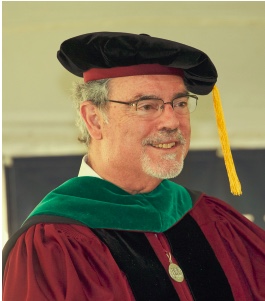As a faculty member of the Boston University School of Medicine for over 30 years and current Associate Dean and Director of Admissions, Dr. Witzburg had heard his share of commencement speeches. However, most of those speeches were less-than-memorable. Even when Senator John Kerry came to speak, Dr. Witzburg could hardly recollect the content of his address. Thus, rather than telling the graduating BA-MD class of the BUSM, Dr. Witzburg posed a riddle for them to ponder: “Why am I here today?”
He goes on to ask each new MD to seek out the answer from within – not to look for help from teachers, mentors, or classmates. “Only you can discover your own uniquely personal answer to this riddle. Only you can dig down deep inside, where you keep your most treasured dreams, where you nurture your most lofty goals, where you drop your guard, look in your internal mirror, and face unafraid who you are and who you hope to be.”
Dr. Witzburg ends his speech with what it means to be a BUSM trained physician: “we advance our science with integrity and that we care for our patients with dignity, with compassion, and with respect simply because it is the right thing to do”.
“If you carry this with you into your future as physicians I am quite certain, that you will end your careers as I end mine – believing that you have done well by doing good, taking delight in the fact that you have never had an uninteresting day, nor gone home without having learned something new, and that your work has been, not a burden, but one of the greatest gifts of your life.”
Read the full speech in the Commencement Archive: https://www.themspress.org/journal/index.php/commencement/article/view/331
About Dr. Robert Witzburg
Dr. Witzburg is Professor of Medicine as well as Associate Dean and Director of Admissions at Boston University School of Medicine (BUSM)—a position he has held since 2002. A 1973 graduate of Tufts University, Dr Witzburg received his M.D. from Boston University School of Medicine in 1977. He completed his internship, residency and chief residency in Medicine at Boston City Hospital, and is board certified in Internal Medicine and Geriatrics. Dr. Witzburg has served the Boston community as Training Program Director and Associate Chief of Medicine at Boston City Hospital for 12 years and then as Associate Chief Medical Officer at Boston Medical Center and as the first Medical Director of the Boston Medical Center HealthNet Plan. He was the first Chief of the Section of Community Medicine at Boston Medical Center and Boston University School of Medicine, serving in that capacity and as Vice Chair of the Department of Medicine from 1997-2002. Dr. Witzburg was also a founder, President, and Medical Director of the Neighborhood Health Plan, a community health center-based HMO focused on enhancing the quality and scope of health care services available to vulnerable populations.



